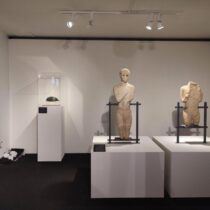A lead curse tablet, dating back around 1,700 years and likely written by a magician, has been discovered in a collapsed Roman mansion in Jerusalem, archaeologists report.
The mansion, which is being excavated by the Israel Antiquities Authority in the Givati Parking Lot, is located in what is known as the “City of David,” an area that holds at least 6,000 years of human occupation. The mansion itself covers at least 2,000 square meters (about half an acre) and contains two large open courtyards adjacent to each other. It was in use between the late third century and A.D. 363, when it was destroyed in a series of earthquakes on May 18 or 19.
The text is written in Greek and, in it a woman named Kyrilla invokes the names of six gods to cast a curse on a man named Iennys, apparently over a legal case.
“I strike and strike down and nail down the tongue, the eyes, the wrath, the ire, the anger, the procrastination, the opposition of Iennys,” part of the curse reads in translation. Kyrilla asks the gods to ensure that “he in no way oppose, so that he say or perform nothing adverse to Kyrilla … but rather that Iennys, whom the womb bore, be subject to her…”
To obtain her goal Kyrilla combined elements from four religions, Robert Walter Daniel, of the Institut für Altertumskunde at the University of Cologne, told LiveScience in an email. Of six gods invoked, four of them are Greek (Hermes, Persephone, Pluto and Hecate), one is Babylonian (Ereschigal) and one, Abrasax, is Gnostic, a religion connected to early Christianity. Additionally, the text contains magic words such as “Iaoth” that have a Hebrew/Judaism origin.
A professional magician likely created the curse for Kyrilla, who may have literally used a hammer and nails to perform a magical rite that enhanced the effectiveness of the curse, Daniel said.
“The hammering and nailing is a form of gaining control over the person(s) targeted in magical texts,” he wrote in the email.
Kyrilla and her curse-recipient, both probably members of the Roman middle or upper class, were likely in some legal dispute, as the curse tablet bears similarities to others found in Cyprus that are known to have been used in legal cases. Additionally the word “opposition” in this text hints at a legal matter.
Exploring the mansion
The newfound artifacts hint at the wealth the occupants of the mansion would have enjoyed and include a miniature head of a boxer athlete used as a scale-weight and several gems, including one engraved with an image of Cupid holding a torch.
The curse tablet itself was excavated in the northwest part of the mansion. While the second-floor room where the tablet was originally placed has collapsed, the artifacts excavated near the tablet provide hints about what the room may have looked like when in use.





